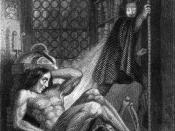Consider the View that Frankenstein is a Story of Enduring Moral Relevance
I am going to investigate the view that Mary Shelley's Frankenstein is a book of enduring moral relevance. I will cover the topics of acceptance in society, revenge, ambition and the consequences of scientific discovery.
The major theme in Frankenstein is the great emphasis placed on appearance and acceptance in society. In modern society as well as in the society of Frankenstein, people judge one solely on their appearance. Social prejudice is often founded on looks, whether it is the colour of one's skin, the clothes that one wears and even the way a person carries himself or herself. People make instant judgments based on these social prejudices. This perception based on appearance determines the behaviour towards the person. In Frankenstein, the society of that time is similar to our own today. It is an appearance-based society, and this topic is brought to the limelight by the hideous figure of Victor Frankenstein's monster to a common human being.
Every human in society wants to be accepted in an intellectual way, regardless of his or her physical appearance. Human beings all want to be accepted in society for their intellectual and physical abilities. Granted some humans aren't recognized for their abilities but acceptance is necessary. If a person is not accepted by society, he or she becomes an outcast like the monster in Frankenstein. The monster seeks acceptance immediately upon getting his new life. Frankenstein shows us in Chapter 5 that the monster's own creator will not look at him for its appearance is too revolting, "Unable to endure the aspect of the being I had created, I rushed out of the room and continued a long time traversing my bedroom chamber, unable to compose my mind to...


